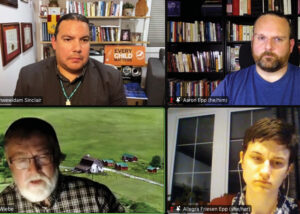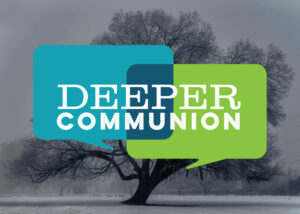It has been more than eight years since the Truth and Reconciliation Commission released its final report, including 94 Calls to Action that various levels of government and religious communities committed themselves to implementing.
Indigenouswatchdog.org is one of the sources I turn to for a thorough and current assessment of the implementation of the Calls. As of March 1, 2024, they report 13 Calls to Action as completed, 47 “in progress,” 19 “stalled” and 15 “not yet started.”
When the topic of conversation surrounding Indigenous relations is on the Calls to Action, I have heard individuals or congregations occasionally distance themselves from feeling any responsibility or power to influence whether or not the Calls are realized in Canadian society.
My hope, though, is that we continue to remember that one cannot opt in (or out, for that matter) of Indigenous relations. From coast to coast, we are neighbours—living on the same lands, walking the same streets, breathing the same air, sustained by the same earth and loved by the one Creator. It is never a question of our being in relationship, but rather what sort of relationship we seek to nourish and incarnate.
I recently heard Elder Adrian Jacobs, senior leader for Indigenous Justice and Reconciliation for the Christian Reformed Church in Canada, describe our collective path as “polishing the tarnished silver of relationship.”
That landed with me as further affirmation of the relationship waters we all swim in, and the invitation for everyone to work toward a polishing. A restoration of connection, marked by truth-telling, curiosity, appreciation, listening, trust and (re)conciliation.
I remember being called out by a Haudenosaunee elder in a workshop. I suggested that reconciliation is akin to science fiction work, working towards a relationship that has yet to be imagined. Her direct response was to correct my perspective and remind me that treaty has always been, and will always be, the relationship that Indigenous communities have offered their neighbours.
We don’t need to imagine anything else. We need to polish the relationship that is already named.
Part of the polishing process is attending to the Calls of Action, seeking to understand the Indigenous knowledge around treaty and engage in myriad other reforms and recommendations that have been named as needed.
This polishing has opportunities in denominational, regional and congregational contexts. In 2016, MC Canada repudiated the Doctrine of Discovery, our collective response to Call to Action 49. Important action, but repudiation doesn’t immediately describe what we are for. It does not immediately impact relationships in any concrete way.
If we understand repudiation not as a finish line, but rather akin to a starting pistol calling us toward (re)conciliation, then, it is my hope, MC Canada can be a resource and encouragement to the regional Indigenous relations working groups and through them to regional collectives and congregations who are rubbing shoulders with Indigenous neighbours on a daily basis. Thereby, polishing the commitment we all have to live toward a future of reciprocity, mutual appreciation, sharing and peace.








Leave a Reply
You must be logged in to post a comment.